Delicate and soft classic French cookies flavored with green tea powder, these Matcha Madeleines make the most delightful sweet treat. Invite your friends over and enjoy it with Japanese tea like sencha, hojicha, or genmaicha.
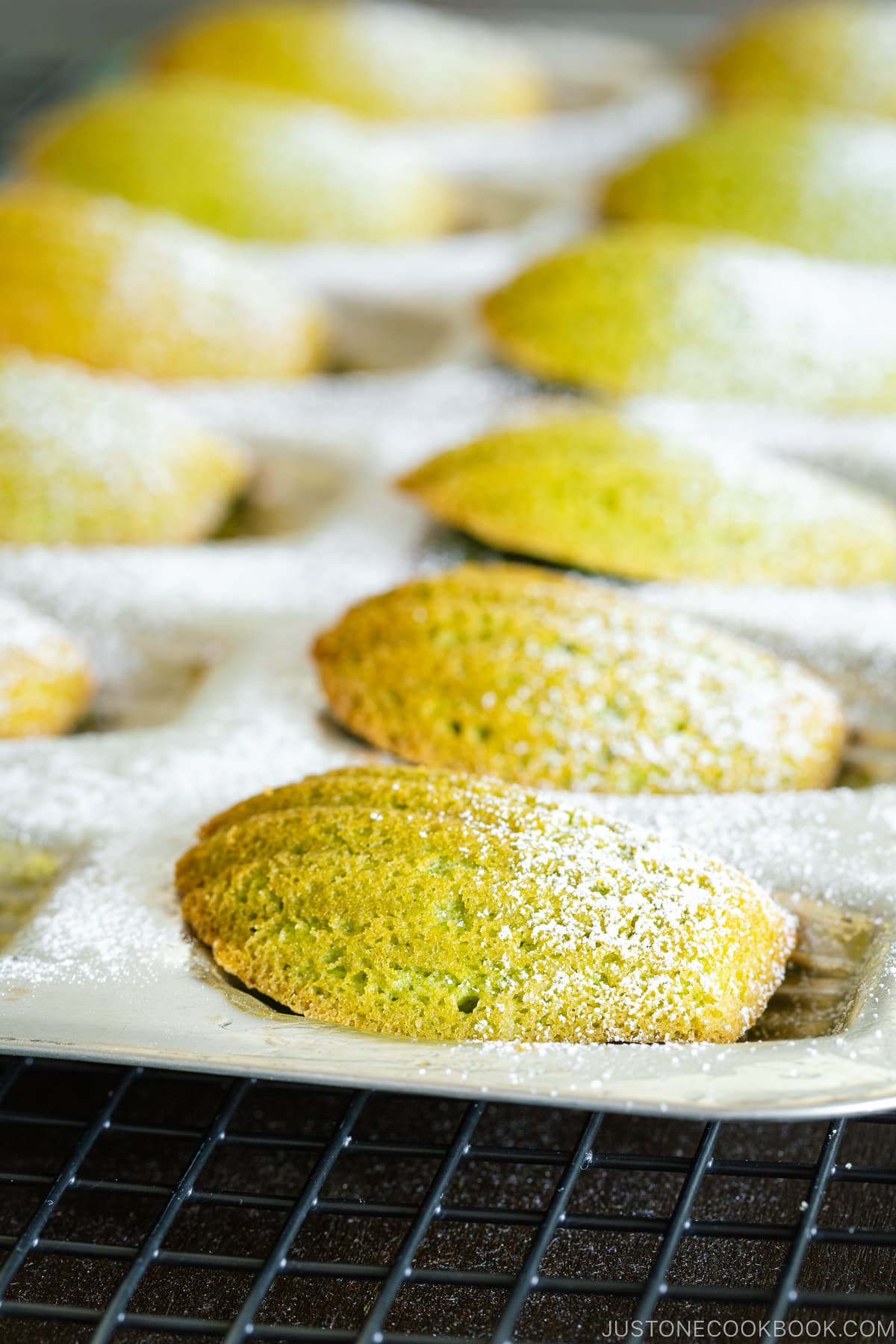
Calling all the matcha fans! The new green tea dessert recipe is (finally) in, and today I’m sharing a delicate and tasty Matcha Madeleines (or Green Tea Madeleines) recipe. If you love these delicious and soft classic French cookies and the unique flavor of matcha, then these delicious madeleines are definitely for you. Why Matcha? Well, it’s my favorite ingredient for sweets and it’s also becoming a popular ingredient here in the States.
The Classic Madeleines
Madeleine is a traditional small cake from Commercy and Liverdun in northeastern France. They are small sponge cakes with a shell-like shape, traditionally flavored with just vanilla, but some also include lemon zest, which is also one of my favorites.
I’ve been making these classic French Madeleines for some time. Most recipes you see are very similar as it’s rather a simple recipe, and I have tested different recipes to see which one my family likes the most. When I tried the recipe from Julia Child’s From Julia Child’s Kitchen, I really liked how perfectly the Madeleines turned out. Since then, I always come back to this recipe, but I changed the ingredients and methods a little bit over time.
There’s no reason to be intimidated by these French tea cakes. Madeleines are probably one of the easiest baking recipes I’ve made, and since my son loves them it’s also one of the cakes that I make most frequently.
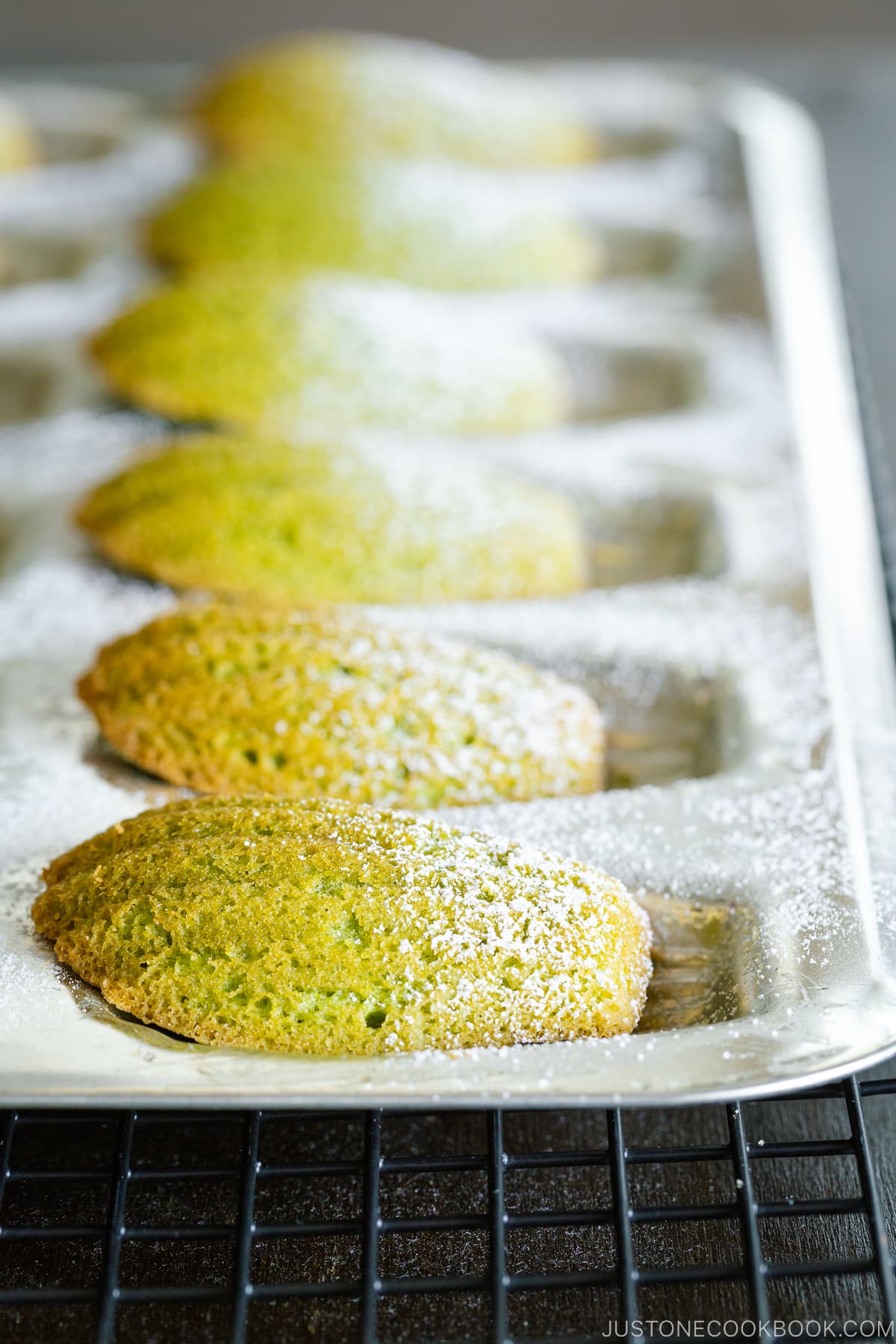
Tips to Make Matcha Madeleines
Here are some tips that will help you make good Madeleines.
- Use room-temperature eggs as they expand in volume when beaten. If you forget to take them out of the fridge, submerge chilled eggs in warm water for several minutes.
- Rest the batter in the refrigerator for at least one hour. I usually just refrigerate the batter overnight. By chilling the batter, it helps to give the madeleines their distinctive bumps (the bulging shape of the cookies).
- Don’t be shy about butter when coating the molds. It helps you take Madeleines out of the pan after baking as well as achieving nice golden color.
- Use a 1 Tbsp measuring spoon to transfer the batter. It’s the easiest way to measure the exact amount for each mold and not overfill.
- Use good quality matcha. The good quality matcha should have a bright green color, not dull green. By the way, you can’t grind regular “green tea leaves” to make matcha. More about matcha below.
- Use metal pans as I think they conduct heat better than silicone molds, but I’ve seen some people make beautiful Madeleines with silicon molds, so it’s up to you.
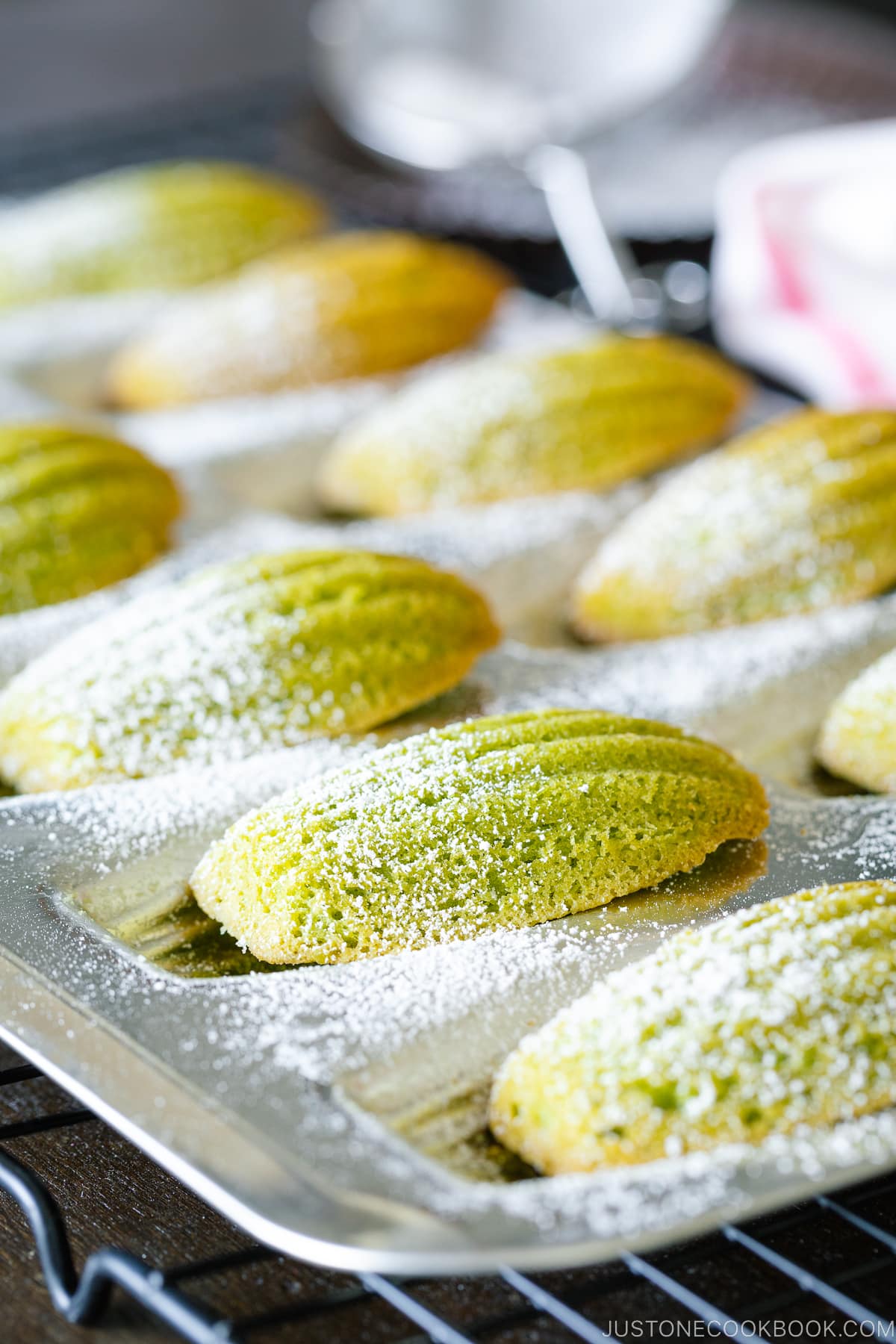
Where to Get Matcha
If there is a Japanese supermarket nearby, try checking their tea section for culinary use matcha. In my local Japanese supermarkets, they carry several grades of matcha powder including this Maeda-en brand matcha powder. In my local Asian supermarkets, I haven’t found 100% matcha powder yet. Be aware of some packages that are labeled “matcha”. Unfortunately, it’s not real matcha and it’s most likely a package for a cold drink that contains matcha and sugar. When it’s 100% matcha, the price should be around $8-10 for 1 ounce (28 grams). Yes, matcha powder is considered very expensive even in Japan. And get a small bag because you will need to use it within 2-3 weeks.
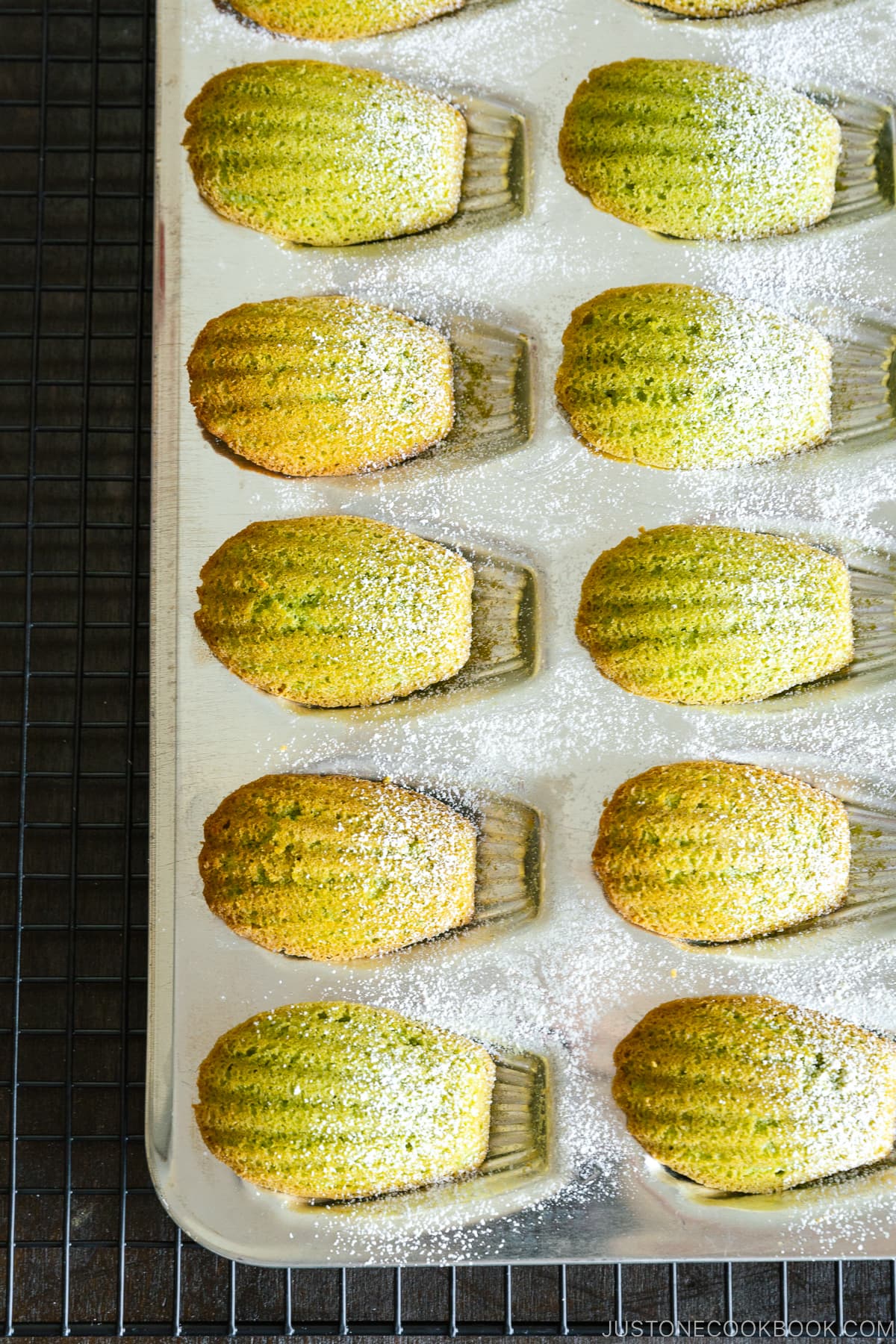
How to Enjoy Matcha Madeleines
From all my taste tests for this recipe, I got to enjoy Matcha Madeleines as an afternoon snack with my children. Instead of European tea, I recommend enjoying these madeleines with Japanese tea, like sencha (煎茶), hojicha (ほうじ茶), or genmaicha (玄米茶). The Japanese teas go much better with matcha-flavored snacks and sweets. I am getting hungry just talking about this dish, time to go open my snack container and enjoy one before my family eats them all. Till next time…
Other Delicious Matcha Recipes
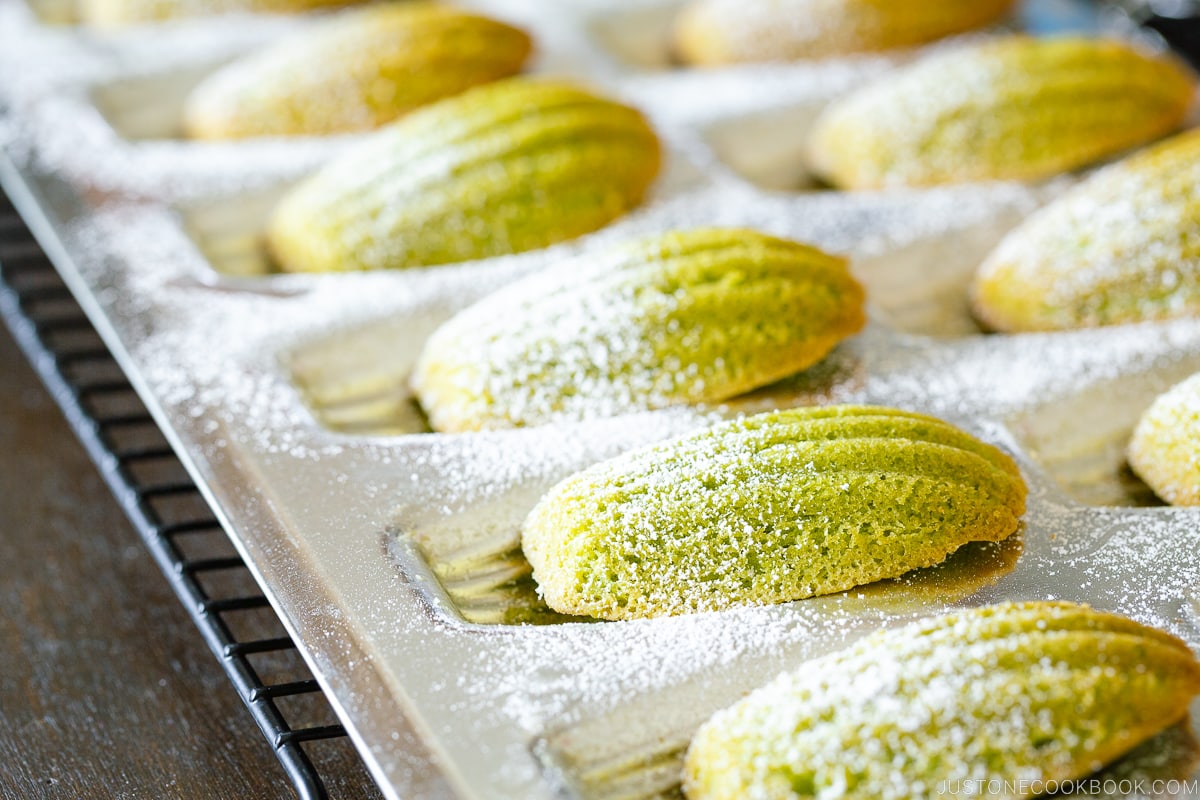
Wish to learn more about Japanese cooking? Sign up for our free newsletter to receive cooking tips & recipe updates! And stay in touch with me on Facebook, Pinterest, YouTube, and Instagram.
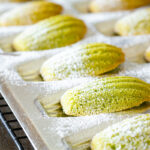
Matcha Madeleines
Video
Ingredients
- ½ cup unsalted butter (1 stick, 4 oz, 8 Tbsp; plus 1 Tbsp for coating the pans)
- ⅔ cup sugar
- 1 cup all-purpose flour (plain flour) (weigh your flour or use the “fluff and sprinkle“ method and level it off; plus 1 Tbsp for dusting the pans)
- ¼ tsp Diamond Crystal kosher salt
- 1 tsp baking powder
- 1 Tbsp matcha (green tea powder) (1 Tbsp matcha is 6 g)
- 2 large eggs (50 g each w/o shell) (at room temperature)
- 1 Tbsp whole milk (at room temperature)
- 1 Tbsp confectioners’ sugar (optional, for dusting)
Instructions
- Before You Start: I highly encourage you to weigh your ingredients using a kitchen scale for this recipe. Click on the “Metric“ button at the top of the recipe to convert the ingredient measurements to metric. If you‘re using a cup measurement, please follow the “fluff and sprinkle“ method: Fluff your flour with a spoon, sprinkle the flour into your measuring cup, and level it off. Otherwise, you may scoop more flour than you need.
- Gather all the ingredients. You will need 2 madeleine pans.
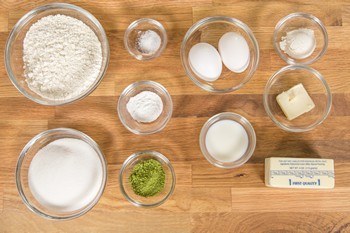
- Melt ½ cup unsalted butter in a small saucepan over medium low heat. Be careful not to burn the butter. Once melted completely, transfer to a small bowl and let it cool.

- In a large bowl, add ⅔ cup sugar. Then sift 1 cup all-purpose flour (plain flour), ¼ tsp Diamond Crystal kosher salt, 1 tsp baking powder, and 1 Tbsp matcha (green tea powder).

- Whisk it all together to combine.
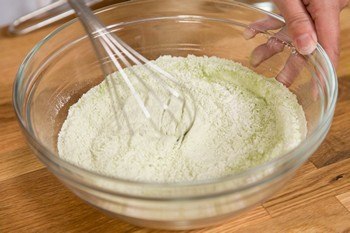
- In a medium bowl, whisk together 2 large eggs (50 g each w/o shell) and 1 Tbsp whole milk until frothy.

- Add the egg mixture into the flour mixture. Using a rubber spatula, stir until just combined.

- Slowly add half of the cooled melted butter. Make sure to blend the butter and mixture well before you add more butter. Mix until just blended and do not overmix.

- Cover the bowl with plastic wrap and refrigerate to rest the batter for 3 hours, or if you have the time, overnight (highly recommended). If you don‘t bake it soon, put the batter in an airtight bag and store it in the freezer for up to 2 weeks.
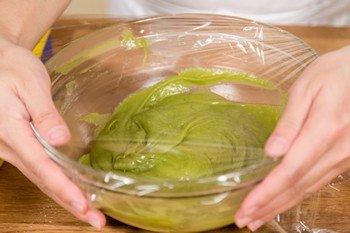
- Center a rack in the oven and preheat the oven to 375°F (190°C). For a convection oven, reduce cooking temperature by 25ºF (15ºC).
- Melt 1 Tbsp butter in the microwave. Using a pastry brush, brush the butter in the molds of two full-sized madeleine pans (12 wells per pan). Then, using a fine-mesh strainer, lightly dust 1 Tbsp flour over the molds.

- Remove the batter from the refrigerator and fill each mold in the madeleine pan with 1 Tbsp of the batter. I scoop the batter with a 1 tablespoon measuring spoon and transfer the batter into each mold with a mini rubber spatula. No need to smooth out the batter in the mold as it’ll melt in the oven.

- Bake at 375°F (190°C) for 11–13 minutes, or until their edges looks done and the tops spring back when touched.
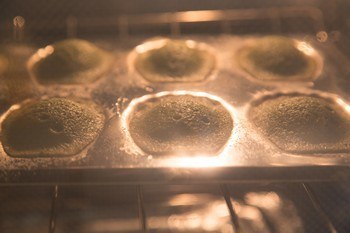
- Remove the pan from the oven and let cool for 3 minutes. Using a fork, gently release the madeleines from the molds and transfer them onto a cooling rack.

To Serve
- The madeleines are ready to serve when they are slightly warm or at room temperature. Dust the tops with 1 Tbsp confectioners’ sugar, if desired. If you are storing/freezing the madeleines, do not dust with sugar until you are ready to serve.
To Store
- Madeleines get dry rather fast and are best eaten within a few hours after they came out of the oven. To store them longer, let the madeleines cool COMPLETELY. Then you can freeze them (they‘ll keep for 2 months) or place them in a resealable plastic bag (and enjoy within 48 hours). Defrost the madeleines at room temperature first before dusting with confectioner’s sugar. The nice crunch they have right after being baked will slowly fade away and the madeleines will become soft.
Notes
2. Using the spoon, sprinkle the flour into your dry-cup measure (the one that measures exactly a cup at the top).
3. Scrape off the excess with a knife. Recipe adapted from Julia Child’s “From Julia Child’s Kitchen”. All images and content on this site are copyright protected. Please do not use my images without my permission. If you’d like to share this recipe on your site, please re-write the recipe in your own words and link to this post as the original source. Thank you.
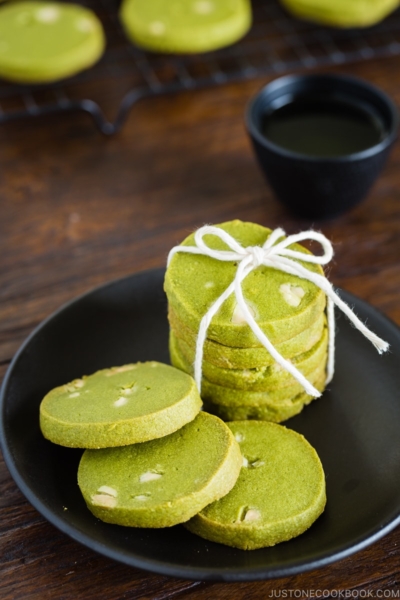
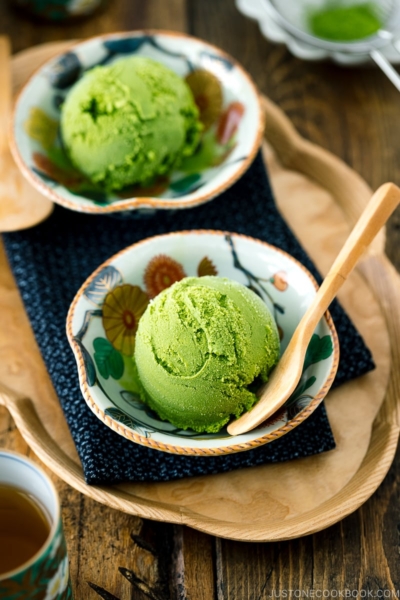
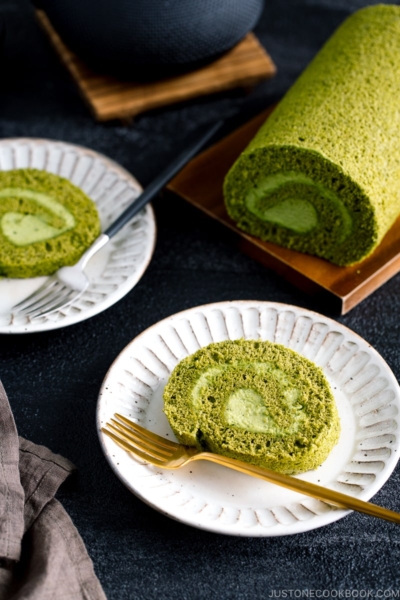
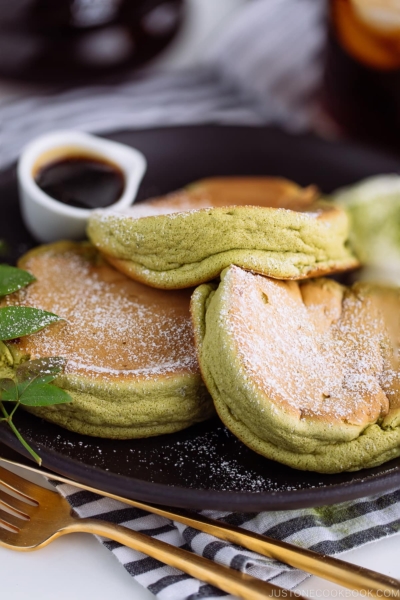
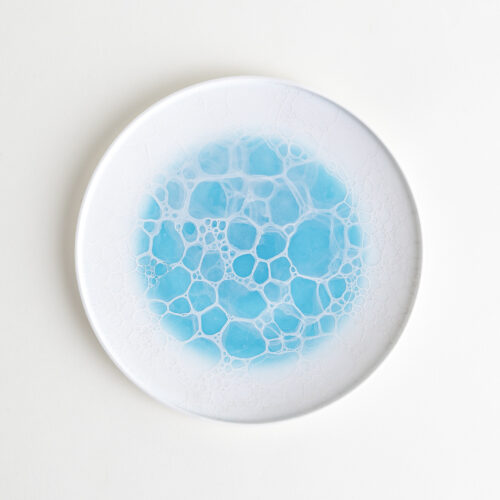
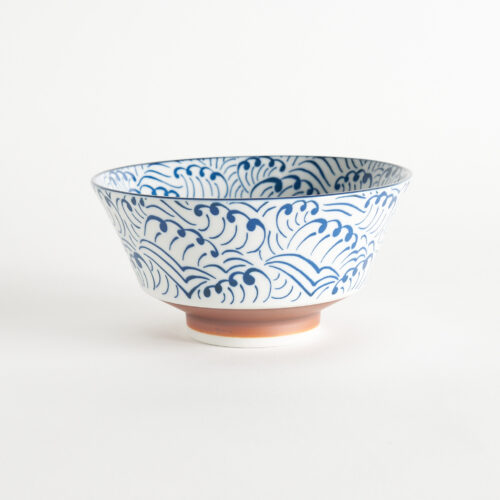
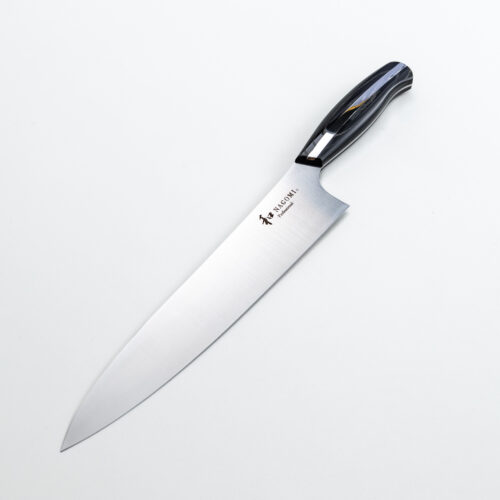
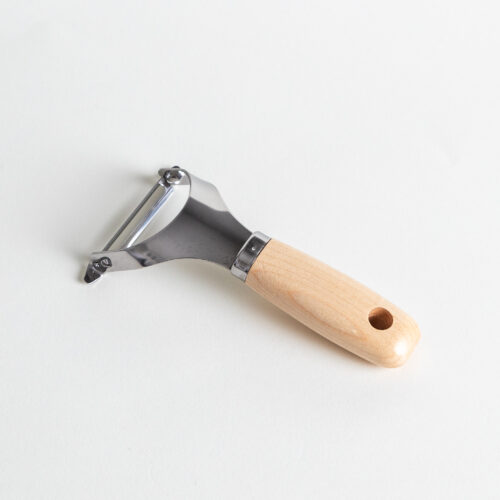

It was my first time using matcha powder and your recipe really helped boost my confidence. It turned out so amazing, I had to make a second batch a few days later.
Q: I used 2 tbsp and it dried out the batter before adding the butter. So I need to increase the liquid portion when I increase the matcha powder?
Thank you
Hi, Virginia! Thank you very much for trying Nami’s recipe.
We are glad to hear you enjoy it.
If you increase the amount of Matcha powder, please lower the amount of flour to maintain the dough’s texture. We hope this helped!
I followed this recipe exactly, and chilled my batter overnight, but the madeleines didn’t come out with the signature tapered “bump” that madeleines usually have. Instead the madeleine came out with one big bump and didn’t expand to fill out the mold (as another commenter mentioned). Any ideas why?
I noticed that in your other madeleine recipe, you said “Bake at a higher oven temperature for the first few minutes. Baking at a higher oven temperature (425ºF or 220ºC) makes a huge difference in the bump formation. The initial super-hot heat that hits the chilled butter is an absolute necessity.” Why didn’t this recipe follow this instruction?
Hi Jamie, Thank you so much for reading Nami’s post and trying different recipes!
Yes. Please feel free to modify the other recipe’s new approach.
This post was published in 2015, and the recipe was adapted from Julia Child’s, as Nami stated. The other Madeleine recipe is more recent and, as you can see, has improved.🙂
https://www.justonecookbook.com/madeleines/
We hope this helps!
Thanks for your response! I actually ended up figuring it out with this recipe and the madeleines came out great!
For anyone else who experienced a similar issue, this worked for me: after taking the batter out of the fridge, I let it thaw for about 15 min so that the batter had a more “sticky” consistency (as compared to the harder and more solid consistency right out of the fridge).
Awesome! Thank you so much for sharing your baking experience with us. 🥰
really love this one Nami, thank you for sharing this recipe love how it taste and made a huge hit, this one gonna be my keeper
Hi, ludwina! Nami and JOC team are so happy to hear you enjoyed Green Tea Madeleines!
Thank you very much for trying Nami’s recipe and for your kind feedback!
This recipe is amazing! I’ve made these multiple times with different flavours by substituting the matcha for something else and they’ve turned out great every time.
I actually made some for my French coworker and he said they tasted authentic!!
Hi Nara! We are so happy to hear you and your coworker enjoyed the Green Tea Madeleines!
Thank you very much for trying Nami’s recipe and for your kind feedback.☺️
Hi, can i substitute the milk for buttermilk? or can i do without the milk?
Hi Jenny! For this recipe, you can use buttermilk, any plant-based milk, or water. However, you may notice the flavor and texture difference.
We hope this helps!
Hi!
I made this recipe and The taste is amazing. I fridge the batter overnight. Just one question, i notice there is bubble on the madeliene. Not sure how to solve it. Please help recommend. Thank you
Hi Ploykaew, Thank you very much for trying Nami’s recipe!
We are glad to hear you enjoyed the Green Tea Madeleines!
The bubble may occur if the batter incorporates too much air or not chilling and resting the batter enough. Try chilling a little longer next time!
We hope this helps!
Heyyy! Love your YouTube channel and didn’t know you had a website so excited to try all the recipes. So, I am currently trying to make this, I made sure to weigh all the ingredients too, but my mixture (dry plus egg and milk) wasn’t as wet as the this mixture in your video but I didn’t want to mix too much so just added the butter and moved on. Will that change the texture of the madeleines?
Hi Henaben! Thank you for finding my site! This is after you rested the batter (step 11) or before (step 8)? How did it turn out?
I don’t have the pan. Can I make maybe circles balls and put it on a normal straight pan?
Hi Hurl! Hmmm I think I can only think of a mini cupcake/muffin pan… or a cupcake pan but don’t use too much batter.
These are excellent, Nami. I appreciate the detailed instructions especially as a baker with limited experience. I used ceremonial grade jo matcha from Kyoto ($$$) purchased from a Japanese coffee shop near me (Neo Coffee in Toronto) and the resultant colour and flavour is phenomenal. The colour is so bright green. I added a little with the dusting of icing sugar to serve and the colour combination is rich.
I found the middles ever so slightly dry as did my family member who I asked to be very critical on my test batch. I wonder what I could tweak to improve this next time. Nami do you have any suggestions?
I cooked only 8-9 minutes until the edges were done (brown) and the tops springy as suggested. I also smelled the browning and didn’t want to overdo them. It was the right call to pull them when I did.
Thank you!!!
Hi Robert! Thank you for your detailed and kind feedback! I’m glad you got to use the high-quality matcha – I can imagine the quality and flavor of your matcha madeleine – very special!
Hmmm madeleines get dry rather fast and are best eaten within a few hours after they came out of the oven. You can increase the moisture by adding a bit more milk. Just a tiny tiny bit? Hope the next batch will come out better! 🙂
The final batter looks too thick. Double, if not triple, the amount of milk as Matcha powder tends to absorb a lot of liquid. Sugar can be reduced too. When I make Matcha madeleines according to Japanese-style recipes, the batter is a lot of thinner in consistency.
Hi Belle! I mentioned in the recipe that this recipe was adapted from Julia Child’s “From Julia Child’s Kitchen”. 🙂
I just made these and they came out great! Nice and fluffy with a bit of a bite to them.
Thank you for all your recipes and the detailed steps, I have tried a few of them and love being able to make some Japanese food that’s hard/impossible to get where I live. Planning to make some mitarashi dango next time 🙂
Hi Lena! I’m so happy to hear this recipe came out well. Thanks so much for your kind feedback. And I’m really happy to know that you cook Japanese food at home using my recipes. Feel free to reach out to me if you have any questions. Happy to help! 🙂
I made this yesterday and the matcha madeleines are so moist and delicious the next day! I actually preferred it the next day compared to when they were freshly baked. After my first batch came out slightly burned, I reduced the temperature to 185°C and baked for 11 minutes. This is probably because my pans are dark coloured.
I tried to make vanilla madeleines too by adding 1 tablespoon of vanilla extract to half the recipe (for 12 madeleines) but the batter was runnier. Nevertheless, they still tasted delicious. What do you suggest I change in order to make vanilla madeleines?
Hi Jessica! Thank you for trying this recipe! I’m really happy to hear you enjoyed the madeleines. 🙂 I feel like 1 Tbsp vanilla seems a lot?
Here’s my suggestion:
Add/swap:
1 Tbsp. lemon juice (instead of milk)
1 Tbsp. lemon/orange zest (instead of matcha)
1 tsp. vanilla
This is more like a classic madeleine recipe. 🙂
I’m not Nami but I tried this last night using self-raising flour (omitting the baking powder) and it turned out delicious too.
Thank you for letting us know, Jessica!
I still have to nail the your sweet recipes but I have some success in your savory ones 🙂 I love matcha so I tried this recipe using non stick Madeleine pan but it overcooked. I probably have to use the metal pan to get the right shape and will cook it right. The cookies are still delicious despite the burned side. Thanks for sharing this recipe 🙂
Hi Rosemarie! I don’t own a non-stick pan, so I can’t tell surely, but I read a lot of articles saying that metal pan works great and I followed. It could be your REAL oven temperature too, despite what your oven said… sometimes inside oven temp can be too high/low. So it’s worth checking it out using the oven-safe thermometer. 🙂 Good luck!